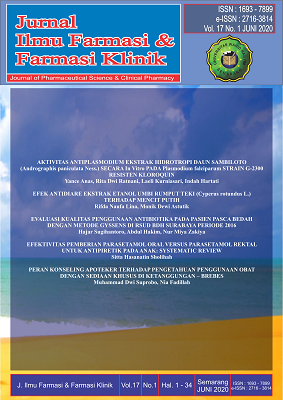Main Article Content
Abstract
ABSTRACT
Diarrhea is a disease characterized by stimulation of bowel movements continuously and feces that
are not formed or liquid that has a frequency of more than 3 times in 24 hours. The incidence of
diarrhea can occur throughout the world and causes 4% of all deaths and 5% of health losses to
cause disability. Cyperus rotundus L. can be used as an antidiarrheal drug because it contains a
compound such as tannins and flavonoids. This research is an experimental study with a Post-test
only Control Group Design. The subjects using white male mice (Mus muscullus) 25 mice and
divided into 5 groups: positive control, negative control, ethanol extracts of rubers Cyperus
rotundus L. with a dose of 250 mg/kgBB, 500 mg/kgBB and 1000 mg/kgBB. Before the treatment,
mice fasted and induced diarrhea (oleum ricini). Obsevations was made by observing the
parameters of diarrhea: duration of diarrhea, frequency of diarrhea and feces consistency every 30
minutes for 4 hours. The numerical data was then processed using SPSS with one way ANOVA test.
The results obtained showed that the administration of extract with a dose of 250 mg/kgBB, 500
mg/kgBB and 1000 mg/kgBB had an antidarrheal with effective dose is 500 mg/kgBB.
Keywords: antidiarrheal, ethanol extract of tubers Cyperus rotundus L., oleum ricini, Cyperus
rotundus
Diarrhea is a disease characterized by stimulation of bowel movements continuously and feces that
are not formed or liquid that has a frequency of more than 3 times in 24 hours. The incidence of
diarrhea can occur throughout the world and causes 4% of all deaths and 5% of health losses to
cause disability. Cyperus rotundus L. can be used as an antidiarrheal drug because it contains a
compound such as tannins and flavonoids. This research is an experimental study with a Post-test
only Control Group Design. The subjects using white male mice (Mus muscullus) 25 mice and
divided into 5 groups: positive control, negative control, ethanol extracts of rubers Cyperus
rotundus L. with a dose of 250 mg/kgBB, 500 mg/kgBB and 1000 mg/kgBB. Before the treatment,
mice fasted and induced diarrhea (oleum ricini). Obsevations was made by observing the
parameters of diarrhea: duration of diarrhea, frequency of diarrhea and feces consistency every 30
minutes for 4 hours. The numerical data was then processed using SPSS with one way ANOVA test.
The results obtained showed that the administration of extract with a dose of 250 mg/kgBB, 500
mg/kgBB and 1000 mg/kgBB had an antidarrheal with effective dose is 500 mg/kgBB.
Keywords: antidiarrheal, ethanol extract of tubers Cyperus rotundus L., oleum ricini, Cyperus
rotundus
